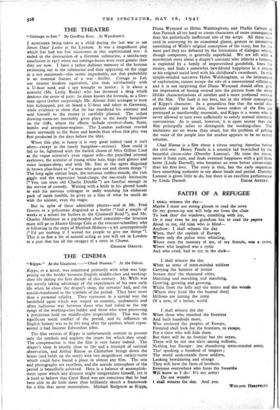THE • THEATRE
"Cottage to Let." By Geoffrey Kerr. At Wyndham's.
I REMEMBER being taken as a child during the last war to see Seven Days' Leave at the Lyceum. It was a magnificent play which has had too few successors in this sophisticated war : it ended in the destruction of a German submarine, a satisfactory conclusion in 1917 when our tonnage-losses were even greater than they are now. I have a rather dubious memory of the heroine swimming out to the submarine and then appearing on the stage in a wet macintosh—this seems improbable, not that probability Is an essential feature of a war - thriller. Cottage to Let, our nearest modern equivalent, also ends satisfactorily with a U-boat sunk and a spy brought to justice: it is about a scientist (Mr. Leslie Banks) who has invented a drug which destroys the sense of pain: he alone knows the formula, so a Ger- man agent (rather surprisingly Mr. Alistair Sun) arranges to have him kidnapped, put on board a U-boat and taken to Germany, while evidence to show that he has murdered his assistant and sold himself to the enemy is carefully planted. The sedate drawing-room-set inevitably gives place to the lonely bungalow on the cliffs, where the effects include revolver-shots, flares, bombs and aeroplane-engines. The London audience reacted more nervously to the flares and bombs than when this play was first produced in the days before the blitz.
When this play is funny it is very good indeed (and it isn't often—except in the lonely bungalow—serious). How could it fail to be, lightened with the foolish charm of Miss Gillian Lind as the vague scientist's even vaguer wife—the pencilled oriental eyebrows, the scimitar of young white hair, huge dark glasses and voice lacquer-deep; and with Mr. Sim as the agent disguised in brown plus-fours as "a man who goes out and shoots things "? The long agile simian leaps, the tortuous rubber-mouth, the rich giggle and the expressive hand-clasps, the too-ready intimacies (" You can trust old Charlie Dimble ") are familiar enough in the service of comedy. Waiting with a knife in his gloved hands to stab his nervous colleague or sadly watching his elaborate pack of cards tumble, he gives us a hint of what he could do with the sinister, even the tragic.
But in spite of these admirable players—and ot Mr. Fred Groves as a policeman disguised as a butler (" had a couple of weeks at a school for butlers in the Cromwell Road "), and Mr. Charles Mortimer as a pig-headed chief constable—the honours must still go to Master George Cole as the evacuee-schoolboy who is following in the steps of Sherlock Holmes—a bit unscrupulously (" I'd get nothing if I waited for people to give me things "). This is as fine a bit of natural acting as you will see in London in a part that has all the swagger of a story in Chums.
GRAHAM GREENE.


























 Previous page
Previous page